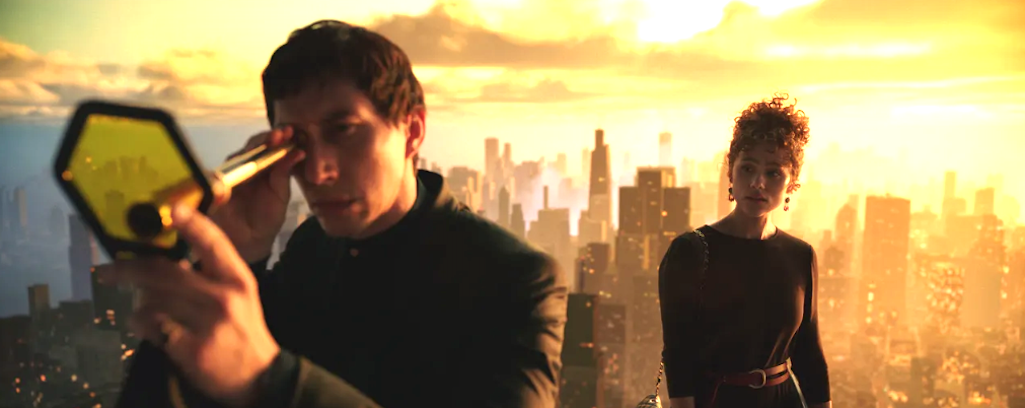
Every parent tells their child to “dream big!” at one point in their life, which is probably what Francis Ford Coppola was thinking when he first started dreaming up Megalopolis. The star-studded passion project was years in the making, and the director even funded the $120 million (!!!!!) flick himself, so he really must believe in it, even if nobody else seems to.
The larger-than-life epic premiered at the Cannes Film Festival on Thursday, and the audience reactions are quite frankly all over the place. Some are loving the star-studded fable, while others are… confused? Hurt? Offended? Who knows! Here’s the plot synopsis to prepare you:
Megalopolis is a Roman Epic fable set in an imagined Modern America. The City of New Rome must change, causing conflict between Cesar Catilina (Adam Driver), a genius artist who seeks to leap into a utopian, idealistic future, and his opposition, Mayor Franklyn Cicero (Giancarlo Esposito), who remains committed to a regressive status quo, perpetuating greed, special interests, and partisan warfare. Torn between them is socialite Julia Cicero (Nathalie Emmanuel), the mayor’s daughter, whose love for Cesar has divided her loyalties, forcing her to discover what she believes humanity deserves.
Make sense? It’s fine if not. It doesn’t seem like it did to anyone else either. Here’s what critics are saying.
Damon Wise for Deadline on the “modern masterwork”:
Megalopolis represents a rare kind of event movie that reinvents the possibilities of cinema to the extent that, halfway through, there’s a very audacious gimmick that tears down the fourth wall in ways younger filmmakers can only dream of. Coppola breaks many of the cardinal rules of filmmaking in the film’s 138 minutes but it upholds the most important one: it is never, ever boring, and it will inspire just as many artists as the audiences it will alienate.
David Ehrlich for IndieWire:
With Megalopolis, he crams 85 years worth of artistic reverence and romantic love into a clunky, garish, and transcendently sincere manifesto about the role of an artist at the end of an empire. It doesn’t just speak to Coppola’s philosophy, it embodies it to its bones. To quote one of the sharper non-sequiturs from a script that’s swimming in them: “When we leap into the unknown, we prove that we are free.”
Richard Lawson for Vanity Fair on the passion project gone “horribly wrong”:
Megalopolis is too confused a film to make a truly odious or dangerous point. This is the junkiest of junk-drawer movies, a slapped together hash of Coppola’s many disparate inspirations.
Peter Debruge for Variety:
Megalopolis is anything but lazy, and while so many of the ideas don’t pan out as planned, this is the kind of late-career statement devotees wanted from the maverick, who never lost his faith in cinema. But now that he’s built it, will they come?
Bilge Ebiri for Vulture:
There is nothing in Megalopolis that feels like something out of a “normal” movie. It has its own logic and cadence and vernacular. The characters speak in archaic phrases and words, mixing shards of Shakespeare, Ovid, and at one point straight-up Latin. Some characters speak in rhyme, others just in high-minded prose that feels like maybe it should be in verse. At one point, Adam Driver does the entire “To be or not to be” soliloquy from Hamlet. Why? I’m not exactly sure. But it sure sounds good.
David Rooney for The Hollywood Reporter:
Does all this hang together as a narrative? Not entirely, and it’s not likely to go down as one of the more incisive responses to our bitterly polarized political landscape. Nor does it ever quite settle on a uniform tone, frequently coming off as both earnest and silly. But it’s never bland, being far too extravagant for that. Who else among contemporary filmmakers is working on this kind of scale anymore, outside of tentpoles?
The film screened for critics in Cannes at an IMAX theater, incorporating a brief live interlude, which I won’t spoil, other than to say it left people wondering if the element will be a part of regular commercial showings. Maybe it’s a tad gimmicky, but it suggests that Coppola sees Megalopolis as an event movie. Given what will likely be a fairly narrow appeal that’s perhaps unrealistic. But if this ends up being the distinguished 85-year-old director’s swan song, at least he’s capping his career with a risk-taking flourish.
Peter Bradshaw for The Guardian:
Certainly a Coppola failure is a whole lot more interesting than the functional successes of lesser directors – the middleweights who aim low and just about hit the target’s bottom rim. But for me this is a passion project without passion: a bloated, boring and bafflingly shallow film, full of high-school-valedictorian verities about humanity’s future. It’s simultaneously hyperactive and lifeless, lumbered with some terrible acting and uninteresting, inexpensive-looking VFX work which achieves neither the texture of analogue reality nor a fully radical, digital reinvention of existence.
Megalopolis stars Adam Driver, Aubrey Plaza, Giancarlo Esposito, Nathalie Emmanuel, Shia LaBeouf, Jason Schwartzman, Talia Shire, Grace VanderWaal, Laurence Fishburne, Kathryn Hunter, and Dustin Hoffman. It does not have a release date yet, but whenever it is, it’s not soon enough
